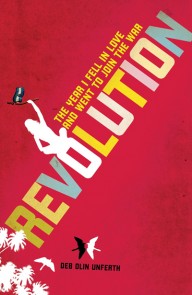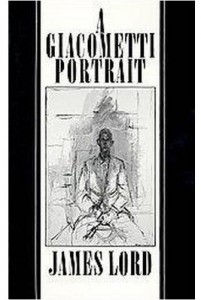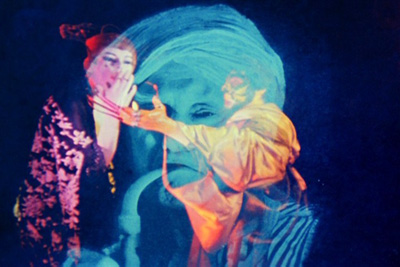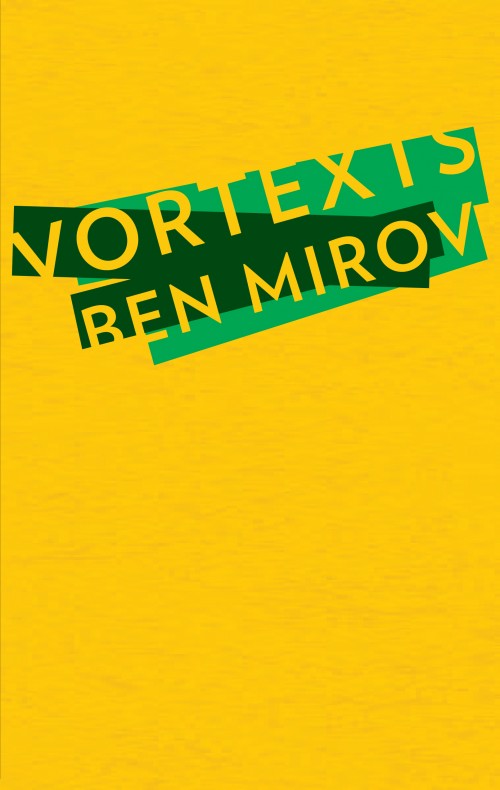6 Books: Deb Olin Unferth on Nonfiction
 In this week’s installment of 6 Books, Deb Olin Unferth, author of the brilliant, laconic memoir Revolution, recommends 6 nonfiction books. Here are her picks:
In this week’s installment of 6 Books, Deb Olin Unferth, author of the brilliant, laconic memoir Revolution, recommends 6 nonfiction books. Here are her picks:
To After That (Toaf) by Renee Gladman
It’s a book dedicated to a book she has written: what is a cooler premise than that?
Parrots for Dummies by Nikki Moustaki
Yes, from the Dummies series, a simple how-to book: feeding, cleaning the cage, etc., but stay with me here. I found the book very moving. Her portrait of the parrot is of a tragic figure in a cage—it feels almost Kafkaesque. She captures the personality of the parrot as a beautiful, complex, panicky person who you’d do anything for in hopes that it’ll fall in love with you. And there’s also the sadness of the author, who you can tell is struggling: she has to write about clipping, though she mostly hates it. She has to talk about breeding though she thinks it’s a terrible idea. She includes pictures of birds flying in the Amazon—there, isn’t that beautiful? Isn’t that where they belong? They fly a hundred miles a day out there, while here they can move only a few feet. Which is better for them, do you think? she wonders.
Changing My Mind by Zadie Smith
This book has shown up on so many lists now that it’s almost like putting Consider the Lobster on this list. But I’m including it here because you know what? Zadie Smith is a badass.
The Autobiography of Alice B. Toklas, by Gertrude Stein
 This may be my favorite book of all time. This is the book that made all my short shorts possible, that made my memoir, Revolution, possible. I first read it riding a train to Chicago and I’ve never been the same. How to write about war and make it funny. How to write about furniture and make it sad.
This may be my favorite book of all time. This is the book that made all my short shorts possible, that made my memoir, Revolution, possible. I first read it riding a train to Chicago and I’ve never been the same. How to write about war and make it funny. How to write about furniture and make it sad.
A Giacometti Portrait, by James Lord
For Lord—who agreed to sit for a portrait for Giacometti—what initially seemed like a pleasant afternoon turned into an existential nightmare, as Lord discovered just what “finishing” a portrait meant to Giacometti.
Atlas of Remote Islands, by Judith Schalansky
How can descriptions of islands far, far away—islands that I’ll never visit, islands that the author has never visited—feel so lonely?
In which This Recording editor Alex Carnevale tells you everything you always suspected about Roald Dahl* (*but were afraid to have confirmed). What do you think of the last sentence? Please don’t answer this question unless you read the whole damn thing.
Sentimental, Narrow, Women’s Writing. Alas, Alack, Anon!

People tend to e-mail me about two things as of late–anything related to gender and One Tree Hill. They’ll say things like, “Have you seen this?” or “What do you think?”
Yes, I know One Tree Hill has been renewed for a ninth season and I couldn’t be happier about it. I have said a few novenas for Hilarie Burton and Chad Michael Murray to return for the final season. If that happens, let’s just say I will be giddy.
Yes, I have seen V.S. Naipaul’s comments that he doesn’t consider any woman writer his equal. I have a Google Alert set up under the phrase, “Bullshit.” He need not worry. We hardly consider him our equal either. Before that Google alert came through though, several people e-mailed me and Tweeted me about Naipaul’s comments. Certain brands of crazy are beneath comment. They cannot be taken seriously. Take Donald Trump, for example. When he began to rant, publicly, about President Obama, it was fairly easy to dismiss his racism and xenophobia because it is difficult to take a man like that seriously. We’ve seen Celebrity Apprentice. His actions were clearly borne of a desperation to remain relevant. Sometimes rich and/or famous people need attention so they say crazy or provocative or stupid things over and over again to get a little attention. (See: January Jones, et al)
I Want It All To Be Kind of Shitty: An Interview with Johannes Göransson

I can’t say enough about how important the work of Johannes Göransson has been to me, both as a field of language and image, and as a person. Besides co-editing both Action Books and Action Yes, two places where you can always depend on reading work that is new, singular, challenging, and actually fun, he has published four full length books of his own work, including Dear Ra, A New Quarantine Will Take My Place, Pilot, and most recently Entrance to a colonial pageant in which we all begin to intricate from Tarpaulin Sky, as well as translations of important Swedish writers like Aase Berg and Johan Jönsson [if you haven’t read his Swedish issue of Typo, holy shit], and wrangling of the insane machine that is the hybrid litblog Montevidayo. Not to mention being a teacher (which, when reading some of his students’ work, and what mechanisms he gets out of them so early, equals a particular feat), a father, a husband, and a person. In no small words, a fucking force.
Over the past few weeks I exchanged emails with Johannes about all of the above and more.
* * *
BB: I remember reading pieces of the Pageant years ago I think under the name New Torture Operations, yeah? How did this project begin and manifest itself into the book it is, on an assemblage level?
JG: Yes, I think that was one early version of what became, among other things the pageant. It also became the second half of the performance piece The Widow Party and my novel Haute Surveillance (which is not published). Assemblages do play a big part in the way I compose these. In part they come out of a piece I wrote over a couple of years a few years ago, The Black Out Sessions or The Secessions (it has many names), and which I haven’t and won’t publish (well I did publish some of them before deciding that it wasn’t the right thing to do), but from which I create various assemblages – such as in The New Torture Operations, The Widow Party and Pageant, all of which form assemblages between torture and fashion, the anorexic body and performance, atrocity and kitsch, colonialism and the nuclear family.
When I was working on these Black Out Sessions I was also studying Brazilian-Swedish artist-poet Oyvind Fahlstrom’s work from the 1950s and 60s and he uses this funny pun – he doesn’t make “collage,” he says he makes “kalas,” which is Swedish for “party”. And the way this works out is that his artworks parties (though it’s usually translated as “feast”) on other works of art or texts. So there’s a party on Mad Magazine, or a party on Burroughs etc. So the Black Out Sessions were parties on just about anything I could find. I was both very creative and totally unfocused so I decided this wasn’t a finished text but something that I would party with/against/on with these other manuscripts. The Black Out texts became a kind of “party” energy which I used on other texts and subject matters to form assemblages. In the particular pieces that are in The New Torture Operations and pageant are parties on this 19th century antique textbook a student gave me years ago – what every student needs to know about the world. This includes chapters on astronomy, “The Vasty Deep,” and “The Flowery Kingdom” (China). A lot of what a student needs to know, it turns out, is about the morality of various colonial ventures (Stanley and Livingston get their own full chapter). Interestingly my home country of Sweden gets I think one sentence in a paranthesis and it’s something like “… (in difference to the Scandinavian countries, about which not much is known other than that they are the ugliest and least intelligent of people).”
June 2nd, 2011 / 1:15 pm
Breast Stein Blood Drug

1. Simmons is running in a fundraiser for breast cancer, and generously giving away unique objects if he gets $600 in pledges. Consider making a contribution.
Also, if you happen to be in Portland tomorrow, Simmons is reading with Tim Horvath in support of the new Conjunctions here.
2. At Jewcy, a great interview with Paris Review editor Lorin Stein by Adam Wilson.
3. Joe Hall & Brandon Shimoda discuss their recent titles from Black Ocean on the radio at The Blood-Jet Writing Hour.
4. Tao Lin has a new weekly column on Vice involving Drug-Related Photoshop Art.
Chris Kraus delivers an excellent review of the first comprehensive biography of Simone Weil. This functions as a good intro to Weil’s philosophy, too.
Ben Mirov’s Vortexts: Release Party + Review
The first time I met Ben Mirov he asked me to “pound it” after I said something funny and ever since then I’ve been sort of unequivocally on-board with Ben Mirov and what he does. I’m glad what he does is poetry. His first two books I is to Vorticism (New Michigan Press, 2010) and Ghost Machine (Caketrain, 2010) are books I recommend to people ceaselessly and re-read often for enjoyment, relaxation, and inspiration. Now he has this bright yellow chapbook called Vortexts to be released by Supermachine this Friday alongside Ben Fama’s likewise brightly-colored New Waves from Minutes Books.
June 1st, 2011 / 7:08 pm
Chris Toll, The Disinformation Phase
Video by Stephanie Barber
Book by Chris Toll
 Pre-orders close this weekend. Order now for advance discount and a chance to win books by CAConrad, Heather Christle and M. Magnus. Chances of winning are high right now.
Pre-orders close this weekend. Order now for advance discount and a chance to win books by CAConrad, Heather Christle and M. Magnus. Chances of winning are high right now.
“I do believe Hell could be driven from the heart with Chris Toll’s amazing new book.”
CAConrad, author of The Book of Frank
“…these poems are tenderly repossessing the ineffable and the commonplace.”
Heather Christle, author of The Trees The Trees
“The Disinformation Phase is conspiracy theory in poetic practice.”
M. Magnus, author of Verb Sap
New From Guernica: Arab-American Fiction
The June issue of Guernica features a special Arab-American fiction section curated by Randa Jarrar. In her excellent introduction to the issue, “From Alienation to Belonging,” Jarrar writes:
When I first went on the academic job market a few years ago, search committees asked what my dream class to teach would be. Arab-American Fiction, I said. They smiled, then invariably asked, “And which writers would you teach in that class?” I would enthusiastically share a list of names—Diana Abu-Jaber, Rabih Alameddine, Alicia Erian, Mohja Kahf, Patricia Sarrafian Ward, Laila Lalami, Leila Halaby—and, usually, none of the names registered. “Do you teach your own book?” some of them asked. I do not. But I do teach short stories by Grace Paley, ZZ Packer, Alice Munro, Nami Mun, Jane Bowles, Jhumpa Lahiri, and Toni Morrison (well, “Recitatif,” Morrison’s short story, and a damn good one). “Why,” some committees asked me, “do you teach American literature alongside Arab-American fiction?”
“Because,” I would answer, “Arab-American fiction is American literature.”
The issue includes fiction from Diana Abu-Jaber, Patricia Sarrafian Ward, Laila Halaby, Youmna Chlala and Alia Yunis.
An Interview with Dan Chodorkoff
Meet Dan Chodorkoff.
He’s not the typical writer we would promote here. He’s got a head full of silverfox hair and an unironically killer moustache, and his writing is unabashedly political. His first novel, Loisaida, is a Bildungsroman, following the development of a young anarchist, Cathy, as she fights “the man” from her squat. A viciously honest rendition of the naïve privilege of many young anarchists, Cathy learns the nuances of activism and politics. Part history lesson, part political guidebook, Loisaida is a book for anyone who’s carried a protest sign, shouted chants, felt the camaraderie of mass demonstrations, and had it all matter for shit.
So, meet Dan. Meet his book. Meet his politics.
LH: Your novel appears to demonstrate an ambivalent relationship towards anarchism. What does anarchism mean to you? Do you consider yourself an anarchist? In what ways does your relationship to anarchism color your portrayal of anarchists?
DC: Anarchism is the most misunderstood and maligned philosophy in existence, and, that misunderstanding may be a bi-product of anarchism itself. Noam Chomsky, in his forward to Daniel Guerin’s fine book “Anarchism: from Theory to Practice”, quotes an unnamed 19th century French writer: “Anarchism has a broad back, like paper it endures anything” including those who’s acts are such that “a mortal enemy of anarchism could not have done better.” The rubric of anarchism encompasses a wide range of thoughts and actions some that I find silly and useless, a few that I deplore, and others that I find extremely admirable. READ MORE >



